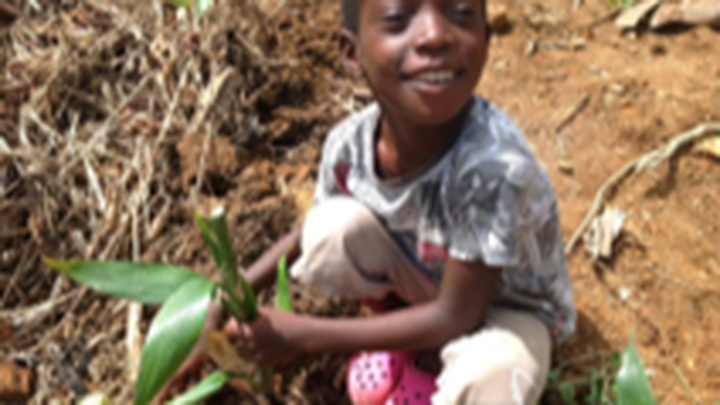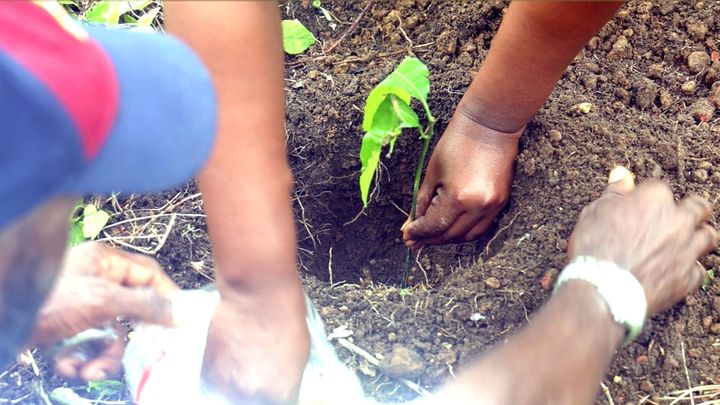We live in a global culture, environment and economy, yet we seldom have direct relationships with those impacted by our choices. We usually do not even know what those impacts are. MaaViva the Institute of Interconnectedness strives to build connections and consciousness through direct relationships.
Frank and I are currently in Cameroon - deepening relationship and coming together with our friends and MaaViva partners to share perspectives, knowledge, creativity, and build together.

A rare rainbow at Lobe Waterfall where a river meets the ocean, during a festival for the Spirit of Water
This year while figuring out my capstone project for my master’s in environmental conservation (The Nelson Institute for Environmental Studies, UW Madison), to my surprise several threads of my life (my relationship to Cameroon, my mom’s organization, my master’s and interest in elephants, and being able to collaborate with my life partner Frank) wove together to bring me back to Cameroon.

Walking along the road in Kribi from Christophe's family home to Mbeki village to plant a tree
Being here in Cameroon, I am reminded of the unimaginable trauma of history (genocide, wars, imposition of foreign cultures, the slave trade) and the ongoing extractive relationships. The extraction and exporting of minerals, timber, etc. leave environmental destruction here, transforming into products sold in Europe, the USA and elsewhere, while little (in terms of local compensation and access to these materials) returns to the people who are directly affected by these industries.

An oil drilling site in the ocean viewed from the beach
At the same point, I am reminded of how many people are working hard to heal the world and how we can find our humanity through coming to know each other, and supporting each other's dreams.
WHAT'S HAPPENING?
Plant trees with Christophe MaVevi in continuation of the Planting Hope - Dr. Mike Kleban Memorial Fund in Kribi. Hopefully we can also plant in Edea and Yaoundé.

Discussing the importance of trees with a beach restaurant owner. Christophe planted trees here 2 years ago and they have already grown tall providing shade (upper left with benches underneath).
- Provides fruits, shade and traditional medicines for people
- Reforestation helps protect coastlines from severe storms and erosion
- Environmental education (especially with children) as part of tree planting activities helps grow knowledge on the importance of trees and build community relationships
Connect With Each Other and Elephants through art (drawing, writing, conversation, music, storytelling, and installation creation) in Kribi with FOJCAM at IFACA (International Festival of Art, Culture, and Agriculture), CASA (Centre de Acuille Le Samaritain – Orphanage), and hopefully at schools in the Kribi Region and Yaoundé.

Victor, Frank, and Bombo constructing an upcycled elephant artistic installation with a black belt in jujitsu for IFACA
- Cameroon is home to forest elephants (Loxodonta cyclotis) which are critically endangered.
- Art allows us to connect with elephants and their importance in the world through creative expression, conversation and sharing.
- The majority of people have never lived in areas with elephants and many people here in Cameroon have never seen an elephant except on TV. Creativity is an avenue that is accessible to all of us.
Build Relationship Through Conversation and passing time together with our brothers and sisters at CASA and the NJEWEL family in Edea and Yaoundé, with Christophe and Victor and their family in Kribi, with Maurice Rabier and his family in Yaoundé, and with those we meet along the journey

Being gifted a book on the history of Kribi while visiting and having deep conversations at the FOJCAM office with Mr. François (Agriculture expert) and Mr. Felix (Treasurer)
- One of the most important ways to learn and heal in my opinion is through building relationships with each other
- For the most part we are staying with our friends in their homes rather than hotels. In this way we can be like a family. We experience firsthand the realities of everyday life here (filling and carrying water for all household uses, washing clothes by hand, sometimes limited food availability, etc.) rather than having an experience very different from most people’s lives. Additionally we get to experience the many gifts of learning about life here, eating delicious home-cooked meals, sharing languages, and joy together.
- In Cameroon there is still a value for spending time with people in conversation which I often find lacking in the US. One may sit for hours conversing with someone which is a deep opportunity to learn and discuss both present, past and future with topics ranging from agriculture, to the traumas of history, to development, or family.
Documentation Through Multimedia Storytelling led by Frank Agrama
- Create visibility and support local partners here as well as helping MaaViva to be able to continue to support their vital work through sharing it.
- Educate people in the US and beyond about the culture, history, current environmental challenges and inspiring work happening in Cameroon
Putting My Master’s Learning into Practice on the Ground
- Evaluation: this is an important part of environmental conservation in order to learn from what has worked well and what hasn't. This will help document the impacts of the work and hopefully provide insight for MaaViva to evolve and as needed.
- Create a working manual for MaaViva to be able to share organizational practices and baseline agreements with those interested in partnership.
- Community engagement through hosting conversations, presentations and artistic explorations will allow me to reflect on what I have learned through the program and grow my facilitation and communication skills.
COLLABORATORS IN CAMEROON
CHRISTOPHE MAVEVI & VICTOR MEVEVI (FOJCAM)

Christoph next to a tree he planted several years ago through Planting Hope
Christophe has been a key partner for MaaViva now for several years planting trees through the Planting Hope - Dr. Mike Kleban Fund (in memory of our dear friend) in Chrisophe's hometown of Kribi. Deforestation due to coastal development has made the coastline vulnerable to severe ocean storms which have been increasing with climate change and oceanic destabilization through extraction projects. The lack of trees on the coastline leaves people vulnerable to the waves and soil easily washes away with erosion. In addition to addressing coastal erosion and helping to create a green barrier to ocean storms, trees planted in villages help provide fruits to support local communities, shade and traditional medicines. Christophe is also a conscious rap artist and eco-builder.
VICTOR MAVEVI

Victor's Jujitsu class in Kribi (FOJCAM)
Victor Christophe’s brother) is a member of a local organization called FOJCAM who is hosting us here as a partner. Victor leads Jujitsu teaching young people martial arts but including the values that accompany this training. A second focus of Victor’s work within FOJCAM is talking about and striving to prevent drugs and violence. Both Christophe and Victor grew up as orphans on the streets here in Cameroon so they know first-hand about these societal challenges.
The brothers partner together to do environmental education. As they explained to me, sports grab people’s attention more than environmental education so it’s a good entry point. They share how Ju Jitsu supports an inner environment of Health and Safety first and foremost, and from there we can build ecological care.
CENTRE D’ACCUEIL LE SAMARITAIN (CASA)

Reunited with CASA family after 7 years
When I was 21 (7 years ago) I lived in Cameroon at Centre D’Accueil le Samaraitain (an orphanage in Edea Cameroon) for 6 months during a project striving to construct an autonomous and ecological orphanage (EcoCasa). Christine Njewel (Maman Do) and Mr. Gilbert Njewel (her late husband) began the orphanage in 2002 in order to adopt two children who were left without any care after their mother passed away. From then forward the government continued to bring them more children who needed a home but without support to do so. CASA has worked tirelessly to find a way (by the grace of god as Maman often says) to feed, clothe, provide healthcare and send the children to school.

Dimitri leads the celebrations through his impressive dance skills!
The time I spent living at CASA profoundly changed who I am. It broke my heart to leave and I cried all the way from Cameroon back to New Zealand because it felt painful to say goodbye to all of my brothers and sisters at CASA and because there is so much inequality in the world that is hard to reconcile within oneself. For seven years now I have tried to return but it never has been the right moment. I’ve asked myself at times if I am supposed to learn to release it and wondered what the right relationship for myself, born an American, is to Cameroon. What has felt true beyond doubt is that I wanted to return to stay connected to my Cameroonian brothers and sisters.
Now many of my little brothers and sisters are young adults (the same age I was when I first visited). They are trying to get technical trainings in Electricity and other trades but often have to suspend their education for lack of funds. At the same time, there are many new children at the orphanage who are quite young.
CHARLES QUENTIN MAURICE RABIER

Presenting to students at a university in Yaoundé
Maurice Rabier lives in Yaoundé with his family. He is an expert in project evaluation and monitoring and holds strong values of ecology and social well being. He currently is working on an agroforestry project here in Cameroon with his project partner Rohan Guyot Sutherland. A scarcity of funds makes it challenging. I came to know Maurice through the Eco-CASA project 7 years ago. He is exceptionally kind, skilled and dedicated to good work in the world.
FRANK AGRAMA
Frank Aleph Agrama brings creativity into our living experience, aspiring to cultivate social artistic capacities through Elderberries Threefold Cafe & Circles For A Renewal of Culture. Along with being the artistic director for the MaaViva Institute, he co-creates with the creative sentiment of Earth Union.
ZURI BURNS
Zuri cares deeply about people and the environment. Currently completing a master’s in environmental conservation at UW- Madison, Zuri works in community-based conservation & conversation. She is particularly inspired by human-wildlife coexistence (especially elephants). Seven years ago Zuri lived in Cameroon for 6 months during the Eco-CASA project (Bio-construction) and has since returned to Africa for community-based projects with MaaViva. Zuri has experience with natural building, and has recently been a co-worker at Elderberries Threefold Cafe helping to organize gatherings and support community and culture.
YOUR SUPPORT WILL MAKE POSSIBLE:
- Trees = $700 (This would purchase 210 small trees)
- Art Supplies = $700 (This supports materials for the art sessions including paper, pencils, pens, markers, erasers, sharpeners, notebooks, paint, etc. Some of these supplies are also given as gifts to the CASA students and friends' children we visit. All supplies will be left as gifts before we depart)
- Every Day Needs support gifts = $1600 (food, school, and other livelihood needs for the orphans and CASA, Christophe’s family and Maurice’s family. In order for the continuation of these people’s healing work, basic needs must be supported. We also wish to gift our hosts for their generosity in welcoming us into their homes and lives).
- Contribution towards travel expenses necessary to make this relationship building and collaboration possible = $2000 (This will not fully cover expenses but will go towards a flight ticket x1, + visas, + malaria medication + transport + yellow fever + food + lodging + other necessary supplies)















